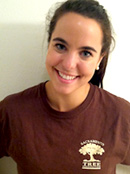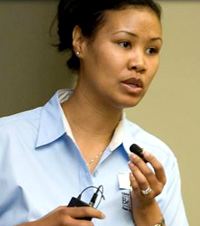With a foothold at Berkeley, ‘engaged scholarship’ goes where it’s needed
Urban forester Lara Roman, a Berkeley grad student, is conducting multi-year research designed to help a Sacramento tree-planting program maximize cooling shade for the area's hot summers. "Engaged scholarship" like Roman's, increasingly popular with students, is part of the campus's DNA. New forms of institutional support are helping it flourish.
February 8, 2012
For the past four summers, Lara Roman has visited Sacramento and its suburbs, requesting residents’ permission to enter their property with her measuring tape, height pole, calipers, camera and clipboard. A specialist in urban forestry, the Berkeley doctoral student crisscrosses the county to check on the health of deciduous trees distributed by the Sacramento Tree Foundation to create shade, cool homes and businesses and reduce energy use.
The Sacramento Shade Tree Program, while ambitious in scale (distributing up to 20,000 trees a year) and elegant in conception, depends on residents to maintain the crape myrtles, red maples and other leafy species they plant in their yards. “When we have these massive tree-planting campaigns” — as many cities do these days — “the question is not how many trees go into the ground,” notes Roman, but how many make it to a mature size, “when they’re giving us all those benefits.”
She designed her multifaceted doctoral research to help the Sacramento nonprofit — and potentially cities across the country that are conducting massive tree-planting campaigns — figure out why many of the newly planted trees are sick or dying, be it poor planting technique or neglect or even injury by weed whacker.
Roman’s work in the greater Sacramento area, and her separate project checking on tree mortality in West Oakland, exemplifies a mode of “engaged scholarship,” which has a firm foothold at UC Berkeley, with strong student interest and new forms of institutional support – including a new website for faculty, “Experiential Learning @ UC Berkeley,” and a new handbook, “Designing Community-Based Courses.”
If a house forecloses
 Undergrad Sophie Ashton, an environmental-studies major, decided to spend a fifth year at Berkeley to help solve an enigma in her field: What happens to trees distributed through a metropolitan tree-planting campaign when residents lose the homes those trees were supposed to shade? If a home goes into foreclosure, are trees planted at that site more likely to get sick or die than trees on properties that don’t change hands?
Undergrad Sophie Ashton, an environmental-studies major, decided to spend a fifth year at Berkeley to help solve an enigma in her field: What happens to trees distributed through a metropolitan tree-planting campaign when residents lose the homes those trees were supposed to shade? If a home goes into foreclosure, are trees planted at that site more likely to get sick or die than trees on properties that don’t change hands?
Ashton is in the process of comparing a large cohort of trees, which urban-forestry grad student Lara Roman is following for her PhD., with realtors’ data on property foreclosures in Sacramento. California’s capital city is one of the nation’s home-foreclosure hotspots, and though it sounds clichéd, says Ashton, “it’s staggering to see the number of homes that have changed hands in recent years.”
Her hypothesis is that there is a correlation between foreclosures and tree mortality. If her hunch proves true, it will be an important piece of information for the city’s shade-tree program, since fewer trees reaching maturity means the program’s projected energy-saving benefits may be overstated.
Ashton considers herself very lucky to have, in Roman, “a fabulous academic mentor — cool, organized and passionate”— and the opportunity to use all she has learned about business, commerce and the environment to help address global warming.
“Community-based participatory research,” “participatory-action research,” “experiential learning” and even “citizen science” are other terms — some more narrowly defined than others — for the strategy of taking scholarship beyond the campus in service of public needs. At its most ambitious, engaged scholarship creates a partnership between campus scholars and community organizations, not as an optional add-on to an academic course or research project, but as its central feature.
AC engagement
A current campus hotspot for teaching and learning in this vein is the American Cultures Engaged Scholarship (ACES) initiative, a collaboration between American Cultures, on the academic side, and Cal Corps Public Service Center.
As Cal Corps’ first full-time manager for engaged-scholarship initiatives, Suzan Akin is a constant witness to students’ thirst “to create coherence or relevance between academic work and their passions,” she says.
Yet launching such a course is not without its challenges — logistical arrangements and safety considerations, for starters, not to mention identifying a promising community partner and designing mutually beneficial projects.
In 2010, American Cultures (AC) received a major five-year grant from the Evelyn and Walter Haas, Jr. Fund to help instructors overcome such hurdles. Through ACES, faculty may apply to become Chancellor’s Public Scholars. Those selected attend a two-day summer institute and receive a research grant of $3,000 to create a new engaged-scholarship course (or revamp an existing course) fulfilling the campus’s American Cultures undergraduate requirement. They may also receive up to $1,500 more for related expenses, including assistance from undergrads or grad students.

Erika Walker teaches a new ACES course on diversity in the workplace.
American Cultures plans to roll out 30 new ACES courses over the next few years. Among the first, this fall, was lecturer Hatem Bazian’s “Islamophobia and Constructing Otherness,” in which students partnered with Zaytuna College, a Muslim institution located in Berkeley, to create educational-outreach materials on anti-Muslim attitudes. Another is a business course on diversity in the workplace taught by Erika Walker, executive director of undergraduate education at the Haas School.
Forty-three students from diverse majors and personal backgrounds enrolled in Walker’s new course this fall, spending many classroom hours looking at ways that gender, age, national origin and other differences function in business contexts. For sophomore Kevin Hsu, however, it was exploring these potent issues as a student-consultant to the Greenlining Institute, a nonprofit working for racial and economic justice, that made the experience stand out.
Campus engaged-scholarship resources
Experiential Learning @ UC Berkeley
New campus website detailing best practices for faculty who offer experiential-learning courses and programs; includes checklists and forms for maximizing student learning, positive community impact and safety for all involved.
Designing Community-Based Courses
New 45-page handbook for faculty interested in incorporating service learning into their teaching. Covers everything from historical development of such programs to tips for finding a community partner and structuring an assessment.
Community-Based Participatory Research Network
Resources for faculty, on the Cal Corps website, including a network of campus scholars who do community-based participatory-action research
American Cultures Engaged Scholarship Symposium
A daylong event, provisionally titled “Why Public Scholarship Matters Now,” will be held from 10 a.m. to 4 p.m. Friday, April 13, in the Townsend Center’s Geballe Room, 220 Stephens Hall.
One student team studied corporate-board diversity; another analyzed the ownership of firms supplying goods and services to Silicon Valley giants. Hsu’s group, meanwhile, was asked to do research and analysis to help the institute create a business case for its services — a time-consuming but rewarding task, says Hsu.
“Before, I thought diversity was just a legal issue,” he says. “Now I see that it plays a big part in everyday aspects of business.”
AC coordinator Victoria Robinson, who directs ACES, says that major multi-year funding has “dramatically shifted the dynamics” of engaged-scholarship partnerships between ACES scholars and the community. When a nonprofit realizes the campus can offer assistance “year after year for at least five years,” rather than for a single semester, they’re able to pose more ambitious research questions and more varied roles for student partners, she notes.
Engaged scholarship has a long tradition at Berkeley, as well as internationally renowned champions in such scholars as Meredith Minkler, professor of public health. Yet it’s Robinson’s observation that community-university partnerships “across the engaged-scholarship continuum” have matured and grown at Berkeley in recent years.
“Skills, methods and conceptual frameworks” supporting engaged teaching and learning have “grown in scope and clarity,” she says — “from the community-organizing and activist scholars of ethnic studies, African American studies and gender and women’s studies to the community-based participatory research in the professional schools.
“Berkeley students are very sophisticated,” Robinson adds. “They don’t see the university as the only holder of questions vital to society.”